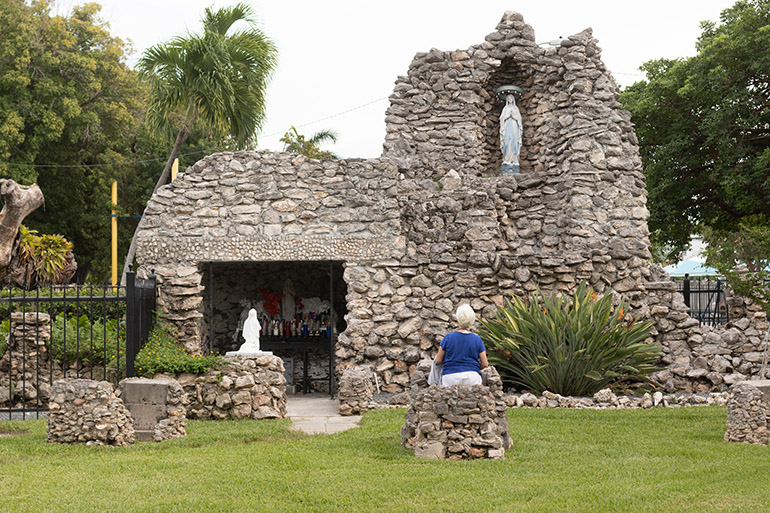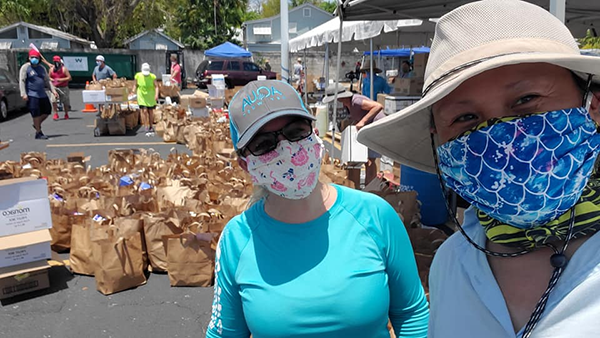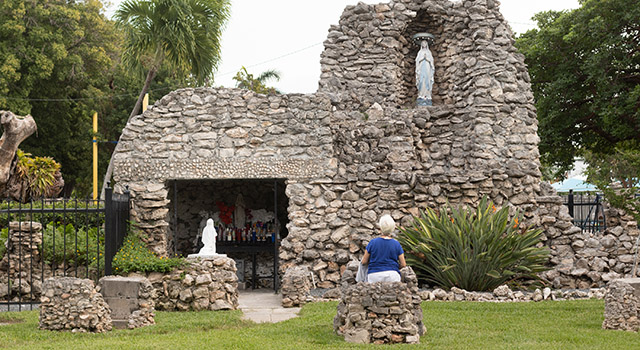By Tom Tracy - Florida Catholic

Photographer: TOM TRACY | FC
A woman takes time for prayer at the historic grotto to Our Lady at the Basilica of St. Mary Star of the Sea in Key West. The minor basilica is one of the oldest Catholic parishes in the state of Florida and the oldest parish in the Archdiocese of Miami. Father John Baker, rector of the basilica, said people continue to come to the outdoor shrine to pray during this coronavirus pandemic.
MIAMI | Locals will say that Monroe County had just started getting back to normal after 2017’s punishing Hurricane Irma when the COVID-19 pandemic again thrust Florida’s southernmost territory into crisis.
Now, charitable agencies in Key West and beyond are back at the table, trying to help Monroe County residents survive the economic fallout.
On March 27, the region effectively shut down all incoming non-essential traffic through two checkpoints, one on U.S. 1 and the other on County Road 905. The move was meant to ward off “day-trippers,” tourists and other non-residents attempting to flee into the Keys.
But the closing of tourist hotels, bars, dine-in restaurants and other businesses represents a big hit to Monroe County’s workforce, an estimated 50% of whom are engaged in the tourism economy.
One big need is food, said Patrice Schwermer, the Key West-based Catholic Charities outreach coordinator for Monroe County. “All of the food pantries are saying they are really having difficulty just remaining stocked so that is an area where we all trying to work on.”
Catholic Charities of the Archdiocese of Miami recently shipped a truckload of 24 pallets of ready-to-eat meals (MREs) to the food pantry at SOS Foundation Star of the Sea Mission on Stock Island. (See related story.)

Volunteers take a selfie near the bags of food and other essential items they were distributing in front of the Basilica of St. Mary Star of the Sea's Rose Renna Activity Center in Key West, April 21, 2020. The distribution was made possible by a coalition of agencies working together in the Keys, including the basilica-affiliated SOS Foundation on Stock Island, Catholic Charities of the Archdiocese of Miami, United Way, Ocean Reef Foundation and Farm Share. See related story: https://bit.ly/2S52K16
Other local food providers are stepping up as well, with donations coming from local hotels and restaurants. The public school district has also been delivering meals to families who are unable to pick up food at distribution centers.
Schwermer said the lack of food supplies in Monroe County is not due to irrational hoarding on the part of locals but represents a real need in the face of uncertainty.
“So many people have lost their jobs and they are seeing incomes decrease,” Schwermer said. Take-out and delivery operations are keeping only a few people employed in the tourism and food industry in Key West.
“As you can imagine all of the housekeeping staff and hotel staff are all laid off and it is really making a huge impact,” Schwermer said.
The Catholic Charities headquarters in Key West, with its two-person staff, is now closed to visitors; clients are being asked to telephone or email their requests for assistance. The office is providing some emergency financial assistance for renters unable to pay their housing bills.
Callers also are being directed to other sources of help including ways to file for food stamps, unemployment benefits and mental health counseling, according to Schwermer, who speculated that the situation looks dire enough that many workers may eventually choose to leave the region, with its high cost of living.
HOMELESS NEEDS
In terms of helping Key West’s homeless population, the city’s Keys Overnight Temporary Shelter is now staying open 24 hours a day and providing more space for residents to keep a safe distance from one another. The Monroe County-based Guidance/Care Center has announced it will provide mental health counseling and referrals to anyone in need during the pandemic, regardless of ability to pay.
“We are now thinking of other creative ways to help people who are homeless get off the streets into safe shelter and putting resources behind these efforts,” Schwermer said. “And we are listening to experts and scientists to inform our decisions rather than putting faith in our own beliefs to support what we want.”
As the deadly pandemic continues to unfold, Schwermer said she and other local agencies are learning to do more online. That includes her job as archdiocesan coordinator for the Catholic Campaign for Human Development, the national anti-poverty program of the U.S. bishops. The CCHD provides grants to support local community-based agencies.
“I have not been able to do on-site reviews of (grant) applicants,” she said, so she has relied on online meetings to do the work.
When the pandemic first hit, everything came to an abrupt halt, she noted, but now nonprofits are figuring out how to adjust in order to continue to work effectively.
Something as big and disrupting as COVID 19 provides an opportunity to evaluate and reset societal priorities and ways of operating at every level, including individual and governmental, Schwermer said.
“All of us are being asked right now to put the common good over our individual wants and needs. In this crisis we are recognizing the value of our service industry workers, public works workers, grocery store workers and health care workers.”
“I hope that we move into a better way of relating to one another, of thinking of one another, caring for one another through our economics, politics and cultural norms,” she added.
In a related development, Peter Routsis-Arroyo, director of Catholic Charities, pointed out that the pandemic has not interrupted construction work at the agency’s St. Bede’s Village workforce housing facility in Key West, expected to be completed later this year.
"One good thing, at least for now, is that they are allowing construction workers to travel down so our housing project is still relatively on-target," Routsis-Arroyo said.
Corrected April 28, 2020: Patrice Schwermer's job title was incorrect in the original story. She is outreach coordinator for Catholic Charities in Monroe County. The program director for Catholic Charities in Monroe County is Meagan Hull.

